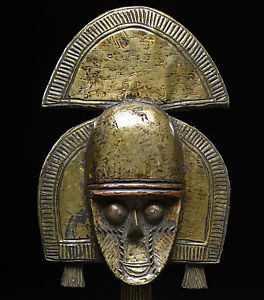| Location: |
Natal Province in South Africa | | Population: |
3 million |
| Language: |
Kwazulu (Nguni) |
| Neighbors: |
Sotho, Tswana, San |
| Types of Art: |
The Zulu are best known for their beadwork and basketry. There have also been some figural sculpture questionably attributed to them. Zulu architecture is quite complex, and the dress or fashion of the Zulu has been carefully studied. |
| History: |
The AmaZulu believe that they are the direct descendants of the patriarch Zulu, who was born to a Nguni chief in the Congo Basin area. In the 16th century the Zulu migrated southward to their present location, incorporating many of the customs of the San, including the well-known linguistic clicking sounds of the region. During the reign of King Shaka (1816-1828), the Zulu became the mightiest military force in southern Africa, increasing their land holdings from 100 square miles to 11,500. Shaka was followed by Dingaan, who tentatively entered into treaties with English colonizers. Mpande was the next King. He allowed the British extensive control over his peoples. By the time he died in 1872, the Zulu had had enough of the English invasion. Cetewayo, Mpande's replacement, tried vainly for six years to avoid a confrontation with the British, yet in 1879 war erupted. Although the Zulu initially experienced some success, the British army eventually prevailed. In less than six months, Cetewayo was exiled to England, and the Zulu kingdom was divided to the British advantage. The last Zulu uprising against European domination was lead by Chief Bombatha in 1906. In recent times, Chief Gastha Buthelezi has doubled as the political leader of the Zulu, and the head of the Inkatha Freedom Party, leading the fight against Apartheid and the ANC, demanding a voice for his people who are more than three million strong. |
| Economy: |
Rural Zulu raise cattle and farm corn and vegetables for subsistence purposes. The men and herd boys are primarily responsible for the cows, which are grazed in the open country, while the women do most, if not all, of the planting and harvesting. The women also are the owners of the family house and have considerable economic clout within the family. In the urban areas of South Africa, Zulu, and in fact all Africans, are limited to labor intensive work and domestic duties. Even as Apartheid as an institution has been dismantled, it is still extremely difficult for Africans to compete for jobs for which they have not been trained, and the country is still entrenched in de facto racism. |
| Political Systems: |
As is evident by the history of the Zulu, the leader, or chief, is invested with power based on his genealogy. He plays an important part in the internal governing of the Zulu homeland and also acts as a voice for his people on an international level. Although the Zulu are officially ruled by the government of South Africa, they often act as a dissenting voice on the national scene. |
| Religion: |
Zulu religion includes belief in a creator god (Nkulunkulu), who is above interacting in day-to-day human affairs. It is possible to appeal to the spirit world only by invoking the ancestors (AmaDlozi) through divination processes. As such, the diviner, who is almost always a woman, plays an important part in the daily lives of the Zulu. It is believed that all bad things, including death, are the result of evil sorcery or offended spirits. No misfortune is ever seen as the result of natural causes. Another important aspect of Zulu religion is cleanliness. Separate utensils and plates were used for different foods, and bathing often occurred up to three times a day. Christianity had difficulty gaining a foothold among the Zulu, and when it did it was in a syncretic fashion. Isaiah Shambe, considered the Zulu messiah, presented a form of Christianity which incorporated traditional customs. |
| Credit: |
McIntyre, L. Lee and Christopher D. Roy. 'Art and Life in Africa Online.' 1998: The Art and Life in Africa Project, http://www.uiowa.edu/%7Eafricart/toc/people.html |
|

